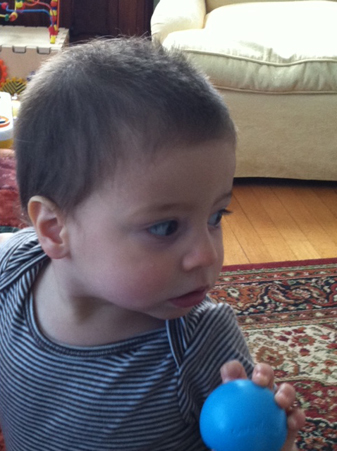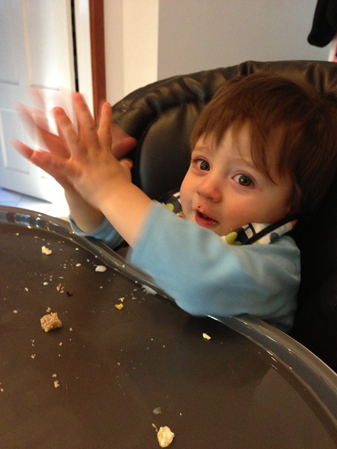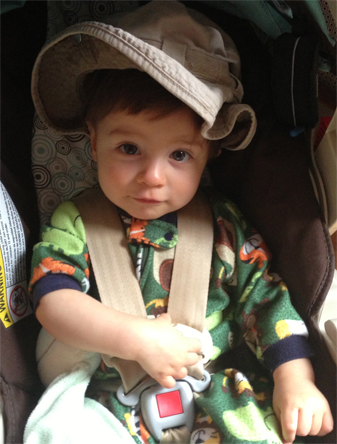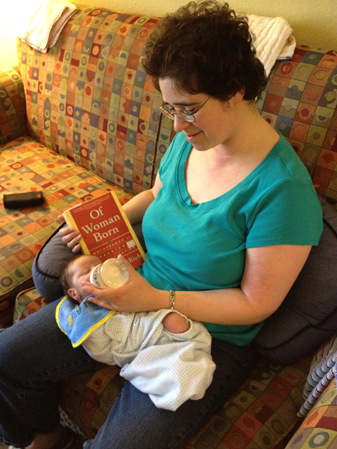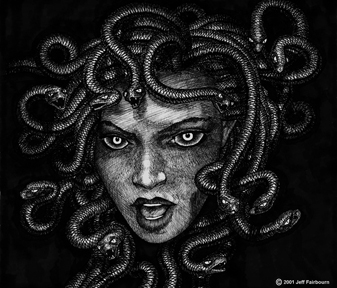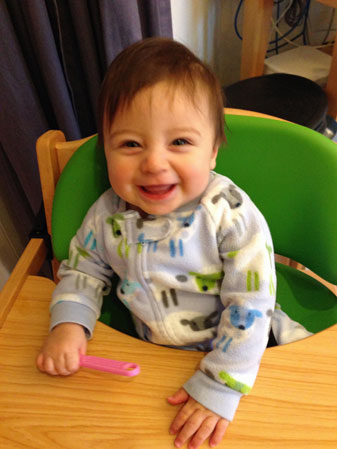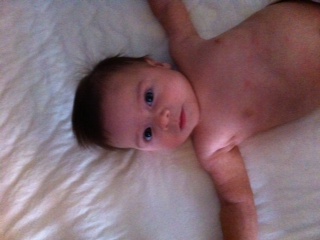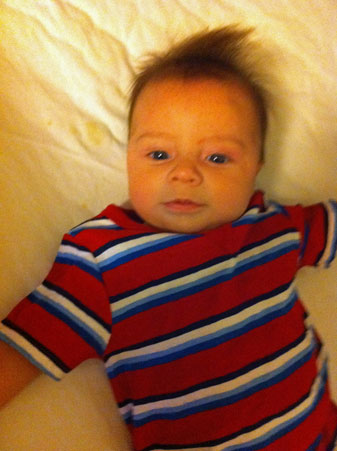…While on the surface motherhood triggered in me a frantic need to grasp onto any minute that could be called mine, I was also opening out into a newfound sense of infinity. It was strangely liberating to have my children’s needs overtake my own. My ego shrank back to its near-invisible place in the cosmos and with that came an unexpected relief, a sense that I could die knowing I had done all I needed to do.
In a matter of months, what had been the centre of my world — namely, my passion for art — became so flimsy and irrelevant it seemed close to total collapse. I didn’t know if I had what it took to demand all that I had to demand of myself, and of everyone around me, in order to write. I had to rail against my own instinct to admit defeat.
Sometimes a thrilling sense of lightness washed through me: finally I was being given permission to retreat into a ‘normal’ life, free from the burden of the artistic imperative, of that constant desire to record everything almost before it’s happened. Together my babies and I floated around the house, equally delighted by their small discoveries, me vicariously reliving my own babyhood and feeling humbled by the insight that someone had cared for me with this same constancy and devotion.
As they got older, I became more and more aware that those days when I sank into my children’s routine without resistance — when I spent hours building sandcastles or reading the same book over and over again; when I let them cook with me no matter the mess, or turned off my ‘adult’ radio station in favour of Raffi and Patsy Biscoe — were our happiest. Not just their happiest, but also mine. But it was a state reliant on the denial of that niggling compulsion to always be turning my experiences into something else, something more.
A year after my first child was born, I wrote in my journal (the same ‘writing’ journal that has as its first line on its first page in red texta: ‘Whole house — clean!!’):
It is what is sustained in our life — through hard work — that creates fulfillment. It’s the stuff we don’t give up easily. The stuff we have to fight for. Day-to-day is easy; I can get caught up in all manner of small tasks. And these could make up a life. So why can’t I be happy with that? What is a life worth living but one lived attentively, with a passion for the small things? Some days those things are good. Baking a cake. Planting a herb garden. Making a picture for my son’s room. But they feel like small asides — distractions from the bigger picture, from the things I really want to achieve.
For the first time in my life, I envied women without strong ambitions outside of the home. Art was like a monkey on my back and I resented its skittish hold on me, the way it caused me to strain away from my babies, to live a split life, be a split self. I was burdened by the knowledge of what it would cost my family (financially, but more so emotionally) for me to keep writing — just as I became aware of how much it would cost me not to.
More than anything, I longed to plunge into the job of mothering in all its fullness, to wake up each morning needing nothing more than this daily existence: a life for life’s sake. It felt greedy, selfish, unworkable, to try maintaining an identity which seemed entirely at odds with the characteristics of a devoted — a ‘good’ — mother.
While motherhood was calling on me to find ever-greater resources of patience, empathy and composure, art felt like an opposing force — an uncompromising, masculine domain. By this logic, to be an artist would mean putting my babies at risk, starving them of their foremost source of attention and stimulus…
…To be an artist means a compulsive process of self-realisation, a struggle toward the ideal that lurks at the edges of our vision. In spite, or perhaps because of, my battle to find time for creative work after having a child, I began to value it like never before. More than that, I began to write like my life depended on it. Art was the only way I knew of coming to terms with the psychic shock of becoming a mother — a role that uncovered the angriest, weakest and most self-seeking, and in turn the most tender, gracious and devoted parts of myself.
I knew that if I buried that creative urge in myself, it would only re-emerge in some ugly and distorted form; that it would not, in fact, make me a better mother but one full of bitterness and frustration — a recipe for martyrdom. Or, perhaps worse, turn me into a monster whose own thwarted ambitions have been transferred on to her children. Sometimes I looked at my baby and experienced his gaze as a challenge, as if he more than anyone would recognise all my terrible failings. I did not want his mother to be a woman who gave up, who didn’t strive to become all she might have been.
Numerous feminist texts have examined the long struggle against educational and institutional barriers that, among other things, considered art an unsuitable occupation for a woman. Many of these books have counted marriage and motherhood among those institutions that serve to limit women’s sphere of influence to the private and domestic. It hardly needs repeating that, by and large, women are still given almost total responsibility for the rearing of children without the cultural recognition of the difficulty and importance of this role.
We seem no closer than 30 years ago to creating a system that genuinely enables women and men to share equally in raising their children. Yet, despite all it demands of women and the inequities that remain, motherhood cannot be reduced to a mere institution of control. Mothers and their children are bound together in ways that defy all simplistic definitions.
In a comment that has stayed with me, writer Helen Garner once talked of ‘the terrific struggle for women’ striving to fulfil destinies beyond being wives and mothers. ‘It’s terribly sad, it’s a very sad thing — a woman trying to be an artist and a mother at the same time. It’s a tremendous clash … ’ She trailed off, perhaps aware of having innocently stumbled into one of those quicksand zones, where the implications of what you are saying are so enormous and unwieldy that you risk being swallowed up. ‘Sad’ was the word she used. It’s a terribly sad thing for women trying to be an artist and mother at the same time.
It is a good word, because sadness is a problem of the heart. And as much as motherhood is a political issue, it can never be only that; the predicament of the artist–mother moves well beyond the boundaries of policy and the expectations of society.
As Susan Rubein Suleiman wrote, perhaps the greatest struggle for a woman artist who has or desires children is the struggle against herself. No amount of money, no amount of structural change, can entirely resolve the fundamental dilemma for the artist–mother: the seeming incompatibility of her two greatest passions. The effect is a divided heart; a split self; the fear that to succeed at one means to fail at the other.
